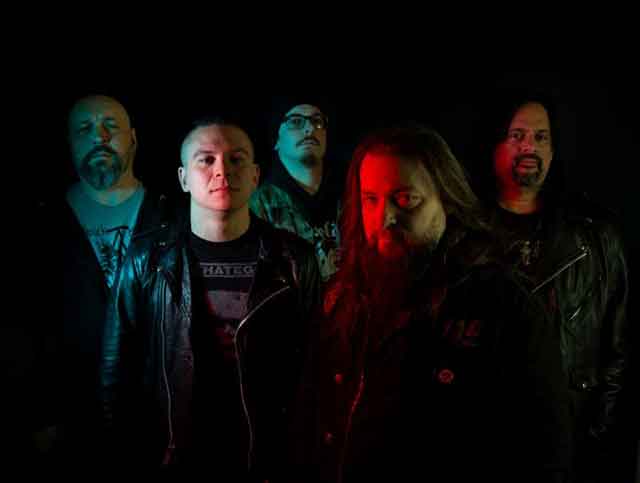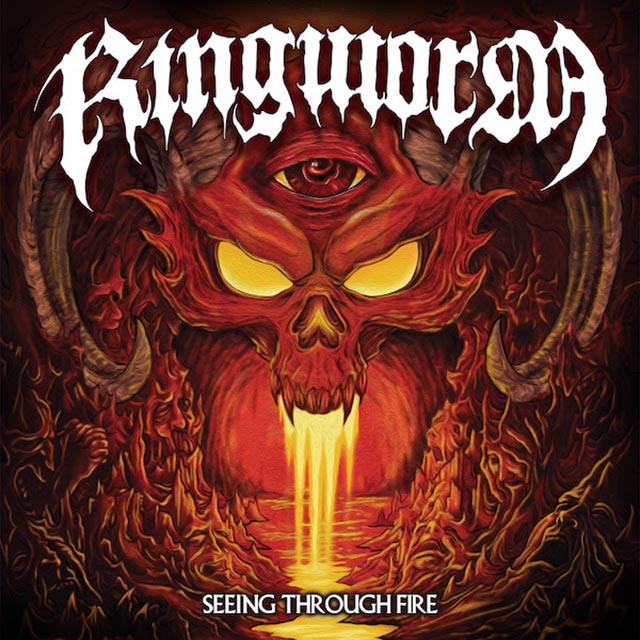“We do and play what we want,” declared Ringworm singer Human Furnace when speaking to us. In a way, that could be viewed as the perfect mission statement for Ringworm. Since coming to life out of the Cleveland hardcore scene of 1991 (and reforming in 1999), Ringworm has played their own take on heavy music, no matter how the hardcore or metal scenes reacted. It wasn’t an easy thing to overcome, yet such a “no fucks given” attitude is part of Ringworm’s charm and part of the reason why they’ve become so beloved by fans and critics of extreme music. It also helps, though, that Ringworm produce vicious, face melting music that backs up such a mentality. And Ringworm further earns the title as one of the best bands blending hardcore and metal today with its new album, Hammer Of The Witch, out March 18 via Relapse Records.
In anticipation of the new album’s release, we had the chance to speak with Human Furnace himself. During our chat, he discussed finding a new, stable home in Relapse Records, and the struggles of being the “black sheep” of metal and hardcore.
Hammer Of The Witch marks Ringworm’s first album with Relapse Records. After four albums with Victory Records, what inspired the band to sign with Relapse?
Well, we’ve never made it a secret that we weren’t happy to be on Victory. We just always felt like a fish out of water there. Their agenda and roster had changed so drastically since we signed with them in 2001, we felt like we had nothing in common with them and that there is/was a larger audience out there that Victory wasn’t willing or able to expose us to. Relapse, on the other hand, caters, obviously, to a more metal audience that I think would appreciate what Ringworm does. Plus they legitimately show enthusiasm to be working with us and are willing to try new things and really promote our music to a broader audience that, literally, has never heard of us. I personally believe the metal scene will dig what we do. Many in the metal scene dismissed us as “another Victory band.”
Both Victory and Relapse are labels that have genres attached to them. Did you find or have you found any stigma by being on labels attached to hardcore and metal, respectively?
Absolutely. Being on Victory, does come with a slight stigma. I could pretty much guarantee that most people in the metal scene do not think to go to Victory Records to find new metal bands, despite their “Victory Metal” stable of acts. We really had nothing in common with any of their “metal” bands. Whereas Relapse have a more authentic roster of true metal and crossover bands. I think we fit in perfect at Relapse.
You’ve previously described Ringworm as being the “black sheep” of metal. What would you say is the biggest difficulty of being a metal/hardcore crossover band?
I’ve said before that often times we “Are too metal for hardcore and too hardcore for metal” which, in many ways is kind of true, unfortunately. I think that many people put to much importance on what “genre” a band is labeled with. And, this is particularly prevalent in the hardcore scene. Don’t misunderstand me, I grew up within the “hardcore” scene (albeit, it was much different in my younger years) and I still have respect and much love for it. BUT hardcore crowds can be the most ignorant, trendy and close minded audience there is. They base whether they like a band on the wrong set of values sometimes. They base a bands value by trendiness, popularity, fashion, scene points, how many breakdown parts they have or soap opera status. Rarely are bands judged by originality or integrity. Not to say this “rating” system isn’t used by crowds in every genre of music, but it is particularly noticeable in the hardcore genre. I’ve always found “metal” audiences to be way more open-minded about bands. If they like it, they don’t care about what you look like or if they heard that you were a “hardcore” band. But like I said, I still love and respect the hardcore scene, but anyone who is really in it will tell you the same things I’m saying about it. You don’t see to many “metal” message boards lighting up with stupid drama about bands or shit like that.
As the years go on, do you find yourself gravitating more towards your metal influences?
Well, you can look at this on a few different levels, I suppose. I would definitely answer yes, but for a few reasons. One, we are all pretty much metal-heads. Sure, some of us came up in the hardcore scene, but we were all born and raised on thrash metal, early death metal, classic rock, punk rock, skate punk and early crossover stuff. So, it’s always been a part of what we do in Ringworm. These days we are just better players and can pull it off better. But our metal influences were always there. We tried to rip off Slayer, Kreator, Voivod, COC and other bands we grew up on, but since we played within the “hardcore” scene, you automatically become a hardcore band. Most hardcore kids have no idea where our influences derive from. I always find it funny when they list “for fans of” and proceed with a list of newer hardcore bands when it should list a series of thrash and punk rock bands.
Tell me about the cover artwork. What inspired the making of the artwork, and how would you say it ties into the music?
The piece is entitled “The White Witch.” It was a piece that I contributed to a gallery show called “Life and Death in Black and White”, that I curated over a year ago that featured many of the most talented illustrators from around the world. The piece took close to 200 hours to complete. I had already had some rough ideas for the new record around that time and I knew that this piece needed to be included. The song and title track derived from the piece. I always like to use a fair amount of occult imagery in my lyrics and in my concepts, so this fit right in with the plan.
[youtube]http://www.youtube.com/watch?v=pqnlFcELKrU[/youtube]
Ringworm has gone through its fair share of lineup changes since its inception. What’s the hardest part of going through such internal changes?
True, but almost any band that has been around for a long time usually goes through significant line-up changes to “keep the train rolling”, but we’ve always managed to keep key members and preserve our sound. We’ve only had 2 major songwriters for the band in our nearly, 25 year history, (Frank 3-Gun / Matt Sorg) and they both played in the band together for quite a few years before Frank left the band, so the transition was smooth.
Some of the hardest things about finding new members is teaching all the material to them. We have a decent size catalog these days. We like to shake up setlists and play songs that we don’t play too often and teaching new members the new stuff AND all the old stuff can get very time consuming. Also, it’s just as important to find a person who we can connect with and get along with. It always helps if we have a lot in common, as far as, where we all come from musically. Plus you have to be willing to basically “throw your life away” and be committed to a travelling band.
If you could go back in time to 1994 (when Ringworm first disbanded) and give yourself one piece of advice about the music industry, what would it be?
Well I don’t think I would tell myself to “Never sell out” because we’ve never done that. I think I’d tell myself to just keep doing what you’re doing because music is going to suck 20 years from now anyway. Maybe I’d tell myself to sign to a different label in 2001. That’s tough to say, really. As long as we’ve been around, we’ve managed to steer clear of any industry control, to a certain extent. Who knows, if things had been different, we may not be here now and I kind of like where we are at these days. We do and play what we want. We don’t have to kiss industry ass, and we get to do what we love, AND sometimes make a little money [laughs].












